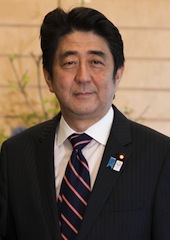Japan: Still Not Owning Up to Its Dark History
Prime Minister Abe’s fourth arrow should be a credible national apology.
October 31, 2013

One of the deep issues which still bedevils Japan is that dark, dark decade and a half of fascist rule, from 1930 to 1945, which continues to be kept in the shadows.
Can anyone imagine Germany’s Chancellor Merkel hamming it up for the media while in the cockpit of a jet fighter marked with the insignia of Nazi Dr. Josef Mengele’s military medical experiment unit?
Yet, that is what Prime Minister Abe did earlier this year when he strapped himself into the cockpit of a jet fighter with the markings of Imperial Japanese Army Medical Unit 731 splashed on the fuselage.
Chancellor Merkel would be obliged to resign instantly, if she did something so outrageous. She would be completely disgraced in German and European politics for eternity.
Despite the outrage which rolled through Asia and Australia following his thoughtless political stunt, Abe explained it away as a “coincidence” and his government continued to push for stealthy, nationalist constitutional reform.
Indeed one of the high points of the recent German election campaign was when Chancellor Merkel accepted the invitation from Dr. Gabriele Hammermann, director of the Dachau commemoration site, and Max Mannheimer, one of the remaining survivors of the Dachau concentration camp, to visit the site with them.
If Germany can do…
Not only did Chancellor Merkel accept the invitation, she also laid a wreath on behalf of the people of Germany in recognition of the profound wrongness of the past of which Dachau was and instrument and today is a symbol. She also subsequently gave a speech warning of the dangers of nationalist extremism.
Doing anything of the kind seems completely unimaginable in today’s Japan, even though the country and its leadership have plenty of reasons to do just that, including very personal expressions of remorse.
…why can’t Japan?
That this isn’t even in the realm of what is contemplated officially in Japan today shows how far Japan’s government is from considering that it has such responsibilities to the past, to the countries it attacked and plundered, indeed to its own people.
Yet the historic record is crystal clear. After all, if Japan’s post-Taisho government which instigated the decade and half of war against Asia, the United States and Australia, in alliance with European fascists, was not fascists, what was it?
True, there is one crucial difference. Japan did not have an explicit extermination policy of Gypsies, Jews, homosexuals and indeed of the Slavic peoples, as did the Nazis. Although the Imperial Japanese Army seldom met a Chinese it did not want to exterminate, to torture, to imprison or otherwise to deprive of their humanity.
But Japan had pretty much everything else when it comes to the traits of fascism. Japan of the 1930s and World War II was marked by corporatist economic management, extremist forms of nationalist indoctrination, racism, intense military dictatorship, vast use of internal repression and total mobilization of the society for war.
The country also used the soon-to-be-urbanized rural poor as cannon fodder in vast campaigns of imperial conquest, as well as the tight integration of corporate Japan in the country’s imperial designs.
Keeping it in the family
Where the intransigence of Japan’s government gets personal – and very much not in the past – is in the role of Japan’s current prime minister Abe’s family played in all of this. His grandfather, Nobusuke Kishi, during the 1930s led the “pacification” of Manchuria and subsequently became munitions minister in Japan’s war cabinet.
After the war, Abe’s grandfather was classed as a Grade A war criminal — until he was let off the hook at the last moment by an America which had become spooked by onset of the nuclear arms race and the fall of China to Mao’s Communist Party.
Japan’s imperial conquest also benefitted many of the politically influential Japanese business families and corporations, who are still in positions of power today.
For example, the family of Taro Aso, Japan’s current Deputy Prime Minister and finance minister, as well as a former prime minister himself, used slave labor in its coal mines during the period of Japanese aggression throughout the Asia Pacific.
At the time, Japanese industry used slave labor from occupied Korea, China and all across the map in military and civilian wartime operations, both within Japan and abroad in conquered regions.
Yet today, the government of Japan essentially refuses to acknowledge responsibility for sex slavery, labor slavery and other atrocities throughout Asia, let alone the violence done to all domestic opposition during the period of Japanese fascist rule.
If not now, when?
Yet, as the Abe and Aso families were so deeply involved in that dark period, there has never been a better positioned prime minister and deputy prime minister to assume this responsibility on behalf of the Japan.
Were these people to assume clearly and simply the responsibility for the past on behalf of the Japanese state, that would indeed represent a significant step for Japan in moving beyond the dark, dark past and allow it to become the “normal” state about which Prime Minister Abe never ceases to speak.
Takeaways
The decade and a half of Japanese fascism from 1930 to 1945 continues to be kept in the shadows.
Even as German leaders continue to make public amends for Nazism, Japanese leaders celebrate or deny past abuses.
Japan may not have had an explicit genocide policy, but in the 1930s & WWII it had all the other traits of fascism.
Past Japanese abuses are relevant now because the PM and foreign minister come from families who perpetrated them.
The government of Japan refuses to acknowledge responsibility for slavery and other atrocities throughout Asia.
The Abe and Aso families were so deeply involved in Japan’s dark period that now is the ideal moment to apologize.
Read previous

Going Backwards in Japan
October 31, 2013
